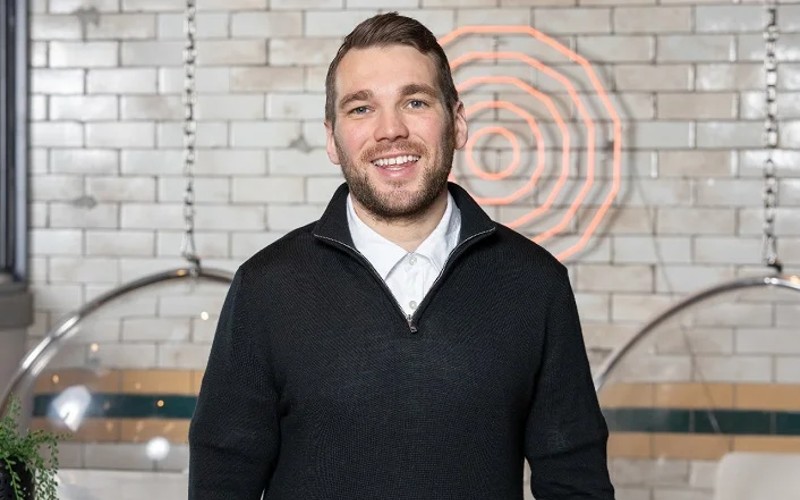In the first edition of a series profiling companies from our Startups 2.0 lists, we speak with Rob Illidge, founder and CEO of Vulse.
Vulse, which featured on Manchester Startups 2.0 and was also selected as a Manchester Tech Climber recently, uses AI to help users create LinkedIn posts based on industry, trends and relevance.
Its personal branding platform has worked alongside Manchester Metropolitan University as part of the region’s four-university AI Foundry.
Illidge, founder of social media agency Social Republic, recently secured a pre-seed round of angel investment while Cardiff-based software developer CarbonCode has taken a 10% stake in the platform.
He shares its journey from inception; explains why he wishes he could do a ‘Dolly the sheep’; and says he is open to further angel investment.
Describe your personal background prior to starting the business.
My journey with social media started in 2006, studying International Business at a Connecticut University where I became one of the first Britons to access Facebook thanks to my American university email address.
I instantly saw the potential opportunities available to businesses using social networks, before moving to Manchester to work for legal, technology and fintech brands.
Frustrated by the lack of transparency offered by agencies, I handed in my resignation at a global finance company one fateful Friday in 2015 and made the decision to start my own business.
Monday arrived, and with nothing more than a plan and a list of names, inspired by a cold calling scene from Will Smith’s Pursuit of Happyness, I got to work.
After a full day of continuous rejection, I caught a break, securing our first clients and Social Republic was born.
The agency went on to be a global success, managing social media campaigns for non-profits and leading brands including the NHS, British Red Cross, eBay and Pioneer.
In 2019, having worked in the social media industry for 11 years, I realised that users were having issues on LinkedIn while trying to grow personal brands or promote the companies they worked for.
People were struggling to think of content ideas, produce engaging posts and find a solution that offered value for money.
This is how Vulse started. We’ve since partnered with Manchester Metropolitan University to develop unique AI features and raised £150,000 with SFC Capital to support our growth.
What is the biggest challenge you have faced to date? How did you overcome this, or plan to overcome this?
The most significant challenge we faced, as a pre-revenue business, was securing external investment which would help us to grow our team, develop relevant features and promote the platform through social media advertising.
At first, I had an idea, the blueprint for Vulse, and attempted to raise funds at this stage. I was advised that to increase our chances of a successful raise, we needed to create an MVP, something that users could test, and that investors could experience. So we got to work, creating a platform with enough features to attract early-adopter customers.
Once we had something to show people we gave it to them for free and asked them in the nicest possible way to break it and give us their honest feedback, whilst also asking them about their needs and wants.
This information was critical to the development of the platform, and resulted in a significant pivot, so that we could provide the features users wanted, at a price point that worked for them.
We then started to approach investors that aligned with our values, sharing our traction and plans for the future.
In April 2023 our first raise was complete, and we haven’t looked back. Three new jobs have been created in the city and we’re soon to launch a product that is going to smash through the ceiling of an already exciting industry.
If you were making a birthday wish for your business, what would you ask for and why?
There’s always the temptation to ask for more wishes, but I’ll stick to the rules and choose one.
It would be to clone the team we have – an effective one, like Dolly the sheep.
Developing an incredible team was the first thing on my agenda, and I genuinely believe we have done that. Everyone has instantly bought into the Vulse vision, they’re passionate about what they do, and always looking for new ways to improve the platform.
Being a good judge of character is something you develop over time, learning something new from each hiring process. One of the most important aspects for investors is a great team, from what I’ve experienced, and I’m proud of those who have joined us.
We’re all working towards the same goal, and we’re really going to shake things up once we’re ready to launch.
But no birthday would be complete without cake, so we’ll have one of those as well.
I’d tell my younger self to view mistakes as opportunities for growth
What benefits does being based in Manchester have for your company? How would you describe the tech scene there? What could it do better?
I chose Manchester as the headquarters for the company, the unofficial second city of England, which has famously used the worker bee as its symbol since it was incorporated in the city’s coat of arms in 1842, representing the hard work of individuals during the Industrial Revolution.
During this time, the height of cotton production, Manchester was a hive of activity with a population of over 95,000, powering 52 mills.
Fast-forward more than one hundred and fifty years to a city where over 63,000 of the 2.5m residents are registered as self-employed, the equivalent of one in every 14 workers.
This worker bee spirit encouraged me to create an agency that offered an alternative to traditional agencies, that very same “new way”.
The same community of freelancers helped to develop Vulse to where it is today, one of the most exciting tech companies in the UK.
In my opinion, the tech scene is thriving in Manchester, and it’s clear to see. Countless startups grow in the city, and so many established brands move here, despite the weather.
One area that we could improve on is investment for start-ups. Attend a funding event here and you’ll always find one conversation discussing how most investments go to businesses in London, and that’s where the money is. Unfortunately, whilst not completely true, there is an alarmingly low amount of support for new businesses in the city that are either pre-revenue or have a minimal viable product (MVP). It is notoriously difficult trying to raise at this stage in Manchester, but let’s hope this improves over time.
Is there anything else you’d like to add?
To close our existing round we’re looking to speak with angels that are excited about our vision to change content creation forever, with a minimum total of £100,000 required.


